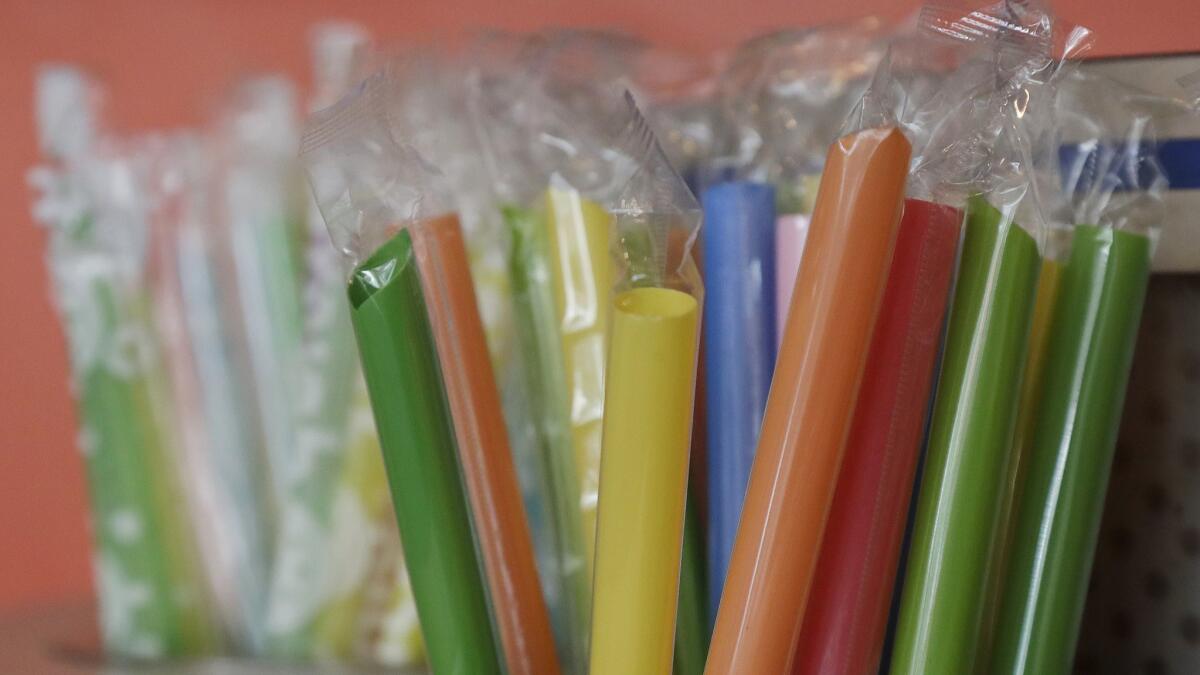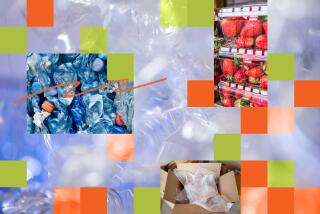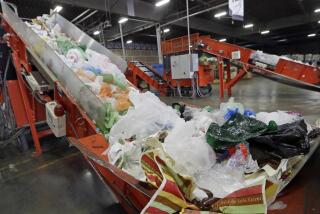Editorial: Going strawless is good, but it won’t save the planet. Let’s go even further

The common plastic beverage straw appears to be on the outs. Seemingly every day another city or company or celebrity vows to say no to straws because of the terrible ecological damage that disposable plastic is wreaking on the planet, especially the ocean. #Stopsucking is a popular social media meme. Local and chain restaurants have quietly transitioned to paper straws — or no straws at all. Some airlines and hotels have stopped handing them out.
The Walt Disney Co. recently announced plans to stop using plastic straws and coffee stirrers at all of its locations by next year. And just before that, Starbucks said it would get rid of most of the straws it hands out by 2020. Between just those two sources, that’s about 1.18 billion fewer straws a year.
It seems just a matter of time before the ubiquitous plastic straw becomes as hard to find as a video rental store. That’s astonishing, considering that the movement to ban straws is barely a year old, and heartening to those appropriately concerned with the ever increasing amount of single-use plastic produced, used and discarded each year. After all, it took more than a decade for California to ban single-use plastic grocery bags statewide even though it was common knowledge that the T-shirt shaped bags were clogging storm drains, littering the landscape and gumming up the machines that sort recyclables.
About 8 million metric tons of discarded plastic ends up in the oceans every year, where it accumulates with the plastic previously discarded.
The heady pace of the straw ban reflects how easy it is to give up something you don’t really need. Human lips were designed to efficiently and neatly consume liquids without the aid of a tube. And for disabled people who do actually need straws to drink, or for the rare occasion when only a straw will suffice, there are paper and reusable metal and plastic alternatives. Still, it’s not easy to break a habit, and plastic straws are one of the bad ones. So good for Disney, Starbucks and every person who tells the waiter not to put a straw in their water or carries around a reusable straw for Big Gulp emergencies.
But here’s the reality check: Going strawless is not going to stop the flow of plastic trash into our landfills, streets and oceans. Even if every plastic straw ever produced was suddenly sucked into a black hole and belched into another dimension, Earth would still have a raging case of plastic poisoning. Straws, which are just a small part of the whole to-go drink ensemble, are a drop in the plastic trash bucket. Remember, if Starbucks is handing out a billion straws to customers every year, it’s handing out a similar amount of plastic lids and cups to go with them.
Enter the Fray: First takes on the news of the minute from L.A. Times Opinion »
That’s sobering. Now just imagine the array of single-use plastic items that consumers encounter every day at home, at the office, at school and at the store. Most of our food comes wrapped in some sort of plastic, as do most products we buy daily. Toothpaste, afternoon snacks, lip balm, AA batteries. Most of it ends up in the trash or recycling bin. But not all. About 8 million metric tons of discarded plastic ends up in the oceans every year, where it accumulates with the plastic previously discarded. That’s not just unsightly, it’s deadly. Plastic doesn’t biodegrade like paper and other organic material; it remains in the water, where some of it is gobbled up by sea creatures that die from starvation or disease when their stomachs fill with plastic they can’t digest. One pilot whale died earlier this year after it ingested 80 plastic bags.
While Americans have been proudly giving up plastic straws, other countries have taken better stock of the scope of the problem and enacted far-reaching bans on single-use plastic items. Meanwhile, even the measly anti-straw movement has become another front in the culture war, with conservative media decrying the criminalization of plastic straws as evidence of liberal overkill. (No matter what you might see on Fox News, Santa Barbara isn’t planning to lock up people who use a straw.) That’s too bad because it suggests the real work ahead — seriously reducing plastic packaging — is going to break on ideological lines, much as climate change does now. That’s ridiculous because, unlike rising carbon levels, you’d have to keep your eyes closed to miss the relentless stream of disposable plastic choking the planet.
Follow the Opinion section on Twitter @latimesopinion and Facebook
More to Read
A cure for the common opinion
Get thought-provoking perspectives with our weekly newsletter.
You may occasionally receive promotional content from the Los Angeles Times.










